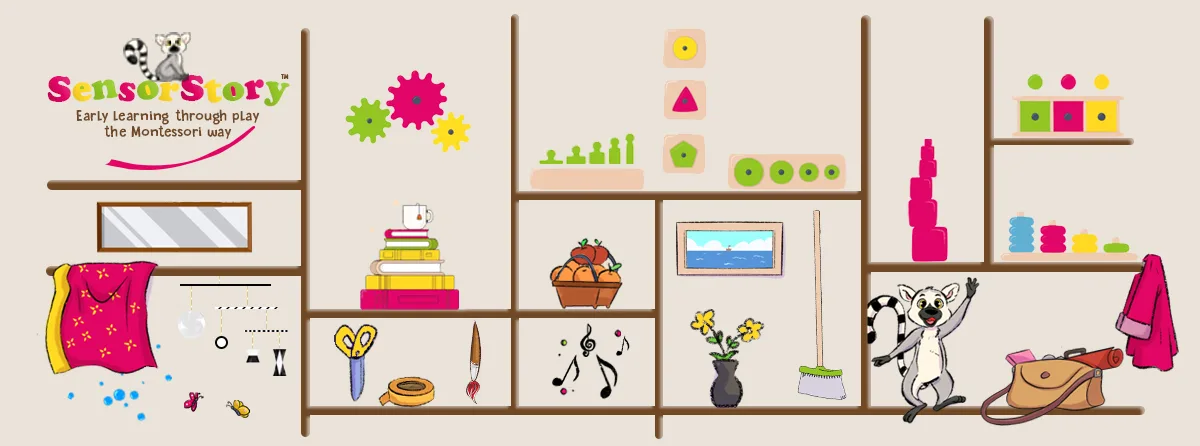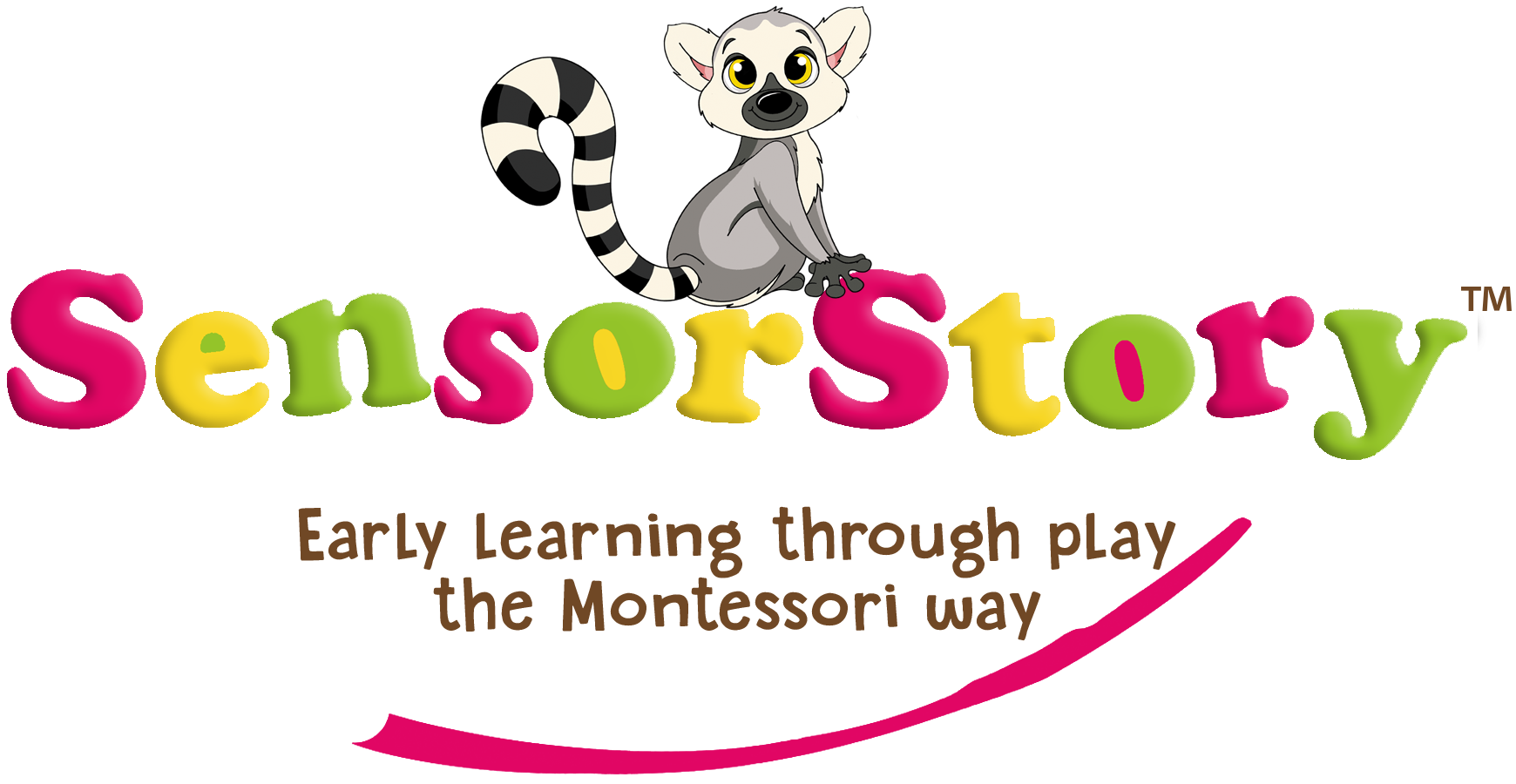We've put together a detailed list of at-home Montessori-aligned activities suitable for a 15-month-old.
Here you will see age-appropriate activities for all areas, in our Ultimate Series Of Activities to try at home, where the emphasis is on providing a prepared environment and allowing the child to actively engage in self-directed learning.
So what is my child working on mastering at this age?
Between the 14-17 month age, your child is typically mastering their movement, fine motor skills, advancing language development, fostering independence in self-care, developing social skills, exploring the environment independently, and engaging in sensory experiences. The Sensitive Periods for order and small objects are in full swing, to learn more about Sensitive Periods click here.
Once your toddler is walking confidently, you will see them looking for new movement challenges; 'maximum effort' becomes important. Maximum effort is when your toddler likes to carry the heaviest objects they can find, trying activities that require their maximum effort.

1. Practical Life:
* Wet and dry pouring: offer a small pitcher and a small glass or cup, with water or dry items like beans for pouring.
* Sweeping: place a shild-sized broom or dustpan in your toddler's environment.
* Dressing Skills: create a child-sized 'wardrobe'; a simple low, open shelved unit or rail to place a small selection of accessible clothes for your toddler to chose from.
* Snack preparation: offer a child-sized age-appropriate knife for spreading, or cutting simple snacks such as soft fruits and crackers.
* Offer opportunities for self-feeding.
* Simple dressing activities: introduce clothes with buttons or snaps for your toddler to practice dressing themselves.
* Care of plants: have small potted plants with a watering can in your toddler's environment and model how to water the plant and clean the leaves with a soft brush or cloth.
* Observation: observe your toddler carefully and respectfully, without interrupting or distracting them, to learn about their needs, interests, and abilities, offering activities that are challenging yet achievable to foster their sense of independence and self-confidence.
* For further guidance on Practical Life Skills and activities by age, click here.
2. Eye-Hand Coordination:
* Building towers: provide soft building blocks for your toddler to stack and knock down, promoting fine motor skills.
* Transferring: have a tray with small tongs or large tweezers, along with containers containing small child-safe objects for transferring, such as wooden or felt balls.
* Threading activities: offer large wooden beads or pasta shapes for threading onto a string.
* Opening and closing: introduce containers with lids for your toddler to open and close.
* Throwing: you can use soft balls or bean bags and throw and catch between one another.
* Disks on a horizontal dowel: Give the child a toy with a horizontal dowel and some wooden discs to let them slide and remove them from the dowel, promoting development of crossing the midline.
* Offer picture matching cards, engage in object-to-picture matching games and colour matching games to promote fine motor skills and visual discrimination.
* Sorting activities: offer bowls or trays with various items to sort - objects with distinct characteristics for sorting such as colour, size or shape.
3. Movement:
* Indoor climbing: arrange soft cushions or mats for your toddler to climb on indoors.
* Ball kicking: engage in activities that involve kicking a soft ball back and forth.
* Offer space for free movement and dancing.
* Maximum effort: do you have any 'heavy' shooping for your toddler to carry in, cans or bottles for example.
* Sand pits offer a wonderful opportunity for gross motor movement.
4. Sensory Exploration:
* Nature touch and feel: bring nature inside with safe objects like pinecones, leaves, or soft fabric replicas for sensory exploration.
* Sensory food exploration: offer foods for your toddler to touch, smell, and explore different textures of safe foods with their hands.
* Water play: supervise water play with a shallow basin, encouraging your toddler to splash and explore different water temperatures.
* Sensory baskets: create baskets with a variety of safe textures for your toddler to touch and explore.
* Touch and feel matching games: place various pairs of fabric scraps of different textures for a sensory matching game.
* Smell activity: offer home-made scented playdough for exploration.
5. Language Development:
* Interactive conversations: engage in simple back-and-forth conversations with your toodler, responding to babbling with smiles, nods, and words, encouraging turn-taking in vocal exchanges.
* Simple storytelling: use simple picture books to tell short stories, engaging your toddler's imagination.
* Create opportunities for language-rich interactions; the toddler’s absorbent mind eagerly learns all of the vocabulary we offer them and are only limited by our own knowledge.
* Repetition of words: repeat words and phrases to reinforce vocabulary.
* Vocabulary baskets: fill a basket with objects and name each object as you take it out, helping your toddler to develop their vocabulary.
* Rhythmic language: poetry, songs, rhyming ditties. Use finger and body movements that go along with them or create your own; shouldn't be too long so not to overwhelm.
6. Culture:
* Botany: Collect natural items like leaves or flowers for simple art projects.
* Offer wooden geography puzzles puzzles featuring continents or countries for geography and world exploration, introducing basic geography concepts like land and water.
* Cultural artwork exploration: display famous artworks from different cultures and artists in your toddlers environment.
* Have multicultural books such as picture books featuring diverse cultures and traditions, discussing different clothing, customs, and daily life. Promote inclusivity and appreciation for cultural diversity.
* Seasonal exploration: discuss the changes in seasons and their characteristics, engaging in seasonal activities like planting seeds or observing nature.
* Nature walks: take outdoor walks to observe and collect items from nature, using magnifying glasses to explore details like leaves, rocks, or insects. Discuss the importance of caring for the environment.
7. Music Exploration:
* Rhythm sticks: offer lightweight sticks or wooden spoons for tapping and creating rhythms, encouraging your toddler to tap on different surfaces to explore sounds. Demonstrate simple tapping patterns for imitation.
* Echo singing: sing short phrases or make simple sounds for your toddler to echo. Repeat rhythmic patterns and encourage vocal imitation. Celebrate your toddlers attempts at vocal expression.
* Body movement and dance: play music and encourage your toddler to move scarves or ribbon to the rhythm.
* Offer simple musical instruments for exploration.
* Gentle lullabies and relaxation: sing soft lullabies or play calming music creating a calming atmosphere with gentle sounds. Incorporate soft rocking or swaying motions.
8. Art and Self-Expression:
* Water colour painting, include a cloth to wipe up spills.
* Simple art materials: offer your toddler some simple art materials such as crayons, paper, and paint. This helps them develop their creativity, imagination and self-expression.
* Simple collage activities: encourage your toddler to glue safe objects or tissue paper onto card.
* Sticker art: offer your toddler sheets of stickers in various shapes and sizes with plain paper for sticking stickers.
* Sensory bag: add a small amount of paint to a sealable freezer bag and securely seal it. Allow your toddler to squish and move the paint around inside the bag for mess-free sensory exploration.
* Stamping activities: offer child-safe stamps and ink pads or paint and encourage your toddler to explore stamping patterns.
9. Social Interaction:
* Playing with blocks is a great way to help your toddler develop their social skills. You can use blocks to promote teamwork and collaboration by building structures together.
* Arrange playdates with other toddlers and provide open-ended toys for collaborative play, encouraging turn-taking.
* Attend group story sessions at your local library.
* Arrange family meals where everyone comes together to share food. Encourage passing food and serving each other. Discuss table manners and socialising during meals.
10. The Whole Child Development:
* Attend our weekly SensorStory Baby and Toddler Montessori parent-child sensory classes! Follow this link to enrol your infant here.
We hope we have given you some inpiration for activities to do with your 15-month-old!
Remember, follow the child, adapting activities based on your observation of your toddler's developmental stage and individual interests. The key in a Montessori environment is to provide your child with real, purposeful, and age-appropriate tools and materials that allow them to engage in activities independently and at their own pace.
Disclaimer: Adult supervision is required for any activity suggested by SensorStory. Please follow any directions and/or warnings on the labels(s) of any materials used during such activity & be aware of any potential choking hazards or allergies.
Click here to see our
Activities To Do With An 18 Month Old FAQ.
